Technology Center of DuPage Culinary Team Wins Illinois ProStart Title for Third Consecutive Year; Advances to Nationals in May
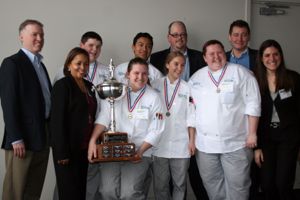 A sea bass, a chicken and a mousse—that’s the menu that sealed the third straight ProStart state championship for the culinary team from Technology Center of DuPage (TCD) in Addison, Ill. The team competed Feb. 8 at the 13th Annual Illinois ProStart® Student Invitational for high-school culinarians, hosted by the Illinois Restaurant Association Educational Foundation (IRAEF) at Kendall College in Chicago.
A sea bass, a chicken and a mousse—that’s the menu that sealed the third straight ProStart state championship for the culinary team from Technology Center of DuPage (TCD) in Addison, Ill. The team competed Feb. 8 at the 13th Annual Illinois ProStart® Student Invitational for high-school culinarians, hosted by the Illinois Restaurant Association Educational Foundation (IRAEF) at Kendall College in Chicago.
The champion culinary team includes: Kristy Fogle, senior (Aurora); Mary Hoare, junior (Wheaton); Courtney O'Neal, senior (Glen Ellyn); and Julio Valeriano, senior (Wood Dale). Jacob Stellmach, another senior from Aurora, is the team alternate. Their first-place state win includes thousands of dollars in scholarship awards. As the state champ, the TCD team has the honor of competing as “Team Illinois” in the culinary competition at the National ProStart® Invitational, May 3-5 in Minneapolis.
All team members are enrolled in TCD’s Culinary, Pastry Arts & Hospitality Management program as an elective part of their respective high schools. Fogle and Stellmach attend Waubonsie Valley; Hoare, Wheaton North; Valeriano, Fenton H.S.; and O’Neal, Glenbard West. Technology Center of DuPage (www.tcdupage.org) offers 20 advanced career and technical education electives to DuPage-area juniors and seniors through a partnership among 14 high-school districts.

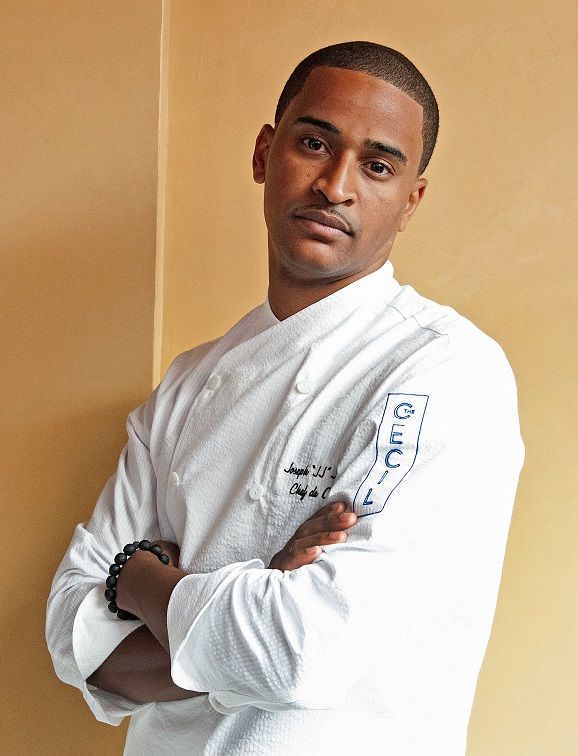 The January 20, 2014, issue of Forbes magazine honored the best up-and-comers in a wide range of fields. In its annual “30 Under 30” list, four graduates of The Culinary Institute of America (CIA) were named in the area of food and beverage. That’s more than any other college or university.
The January 20, 2014, issue of Forbes magazine honored the best up-and-comers in a wide range of fields. In its annual “30 Under 30” list, four graduates of The Culinary Institute of America (CIA) were named in the area of food and beverage. That’s more than any other college or university. CAFÉ’s second-annual Deans and Directors Retreat in February introduced a stellar line-up of thought leaders to passionate educators wishing to grow and strengthen their culinary-arts programs amid sweeping societal evolution.
CAFÉ’s second-annual Deans and Directors Retreat in February introduced a stellar line-up of thought leaders to passionate educators wishing to grow and strengthen their culinary-arts programs amid sweeping societal evolution.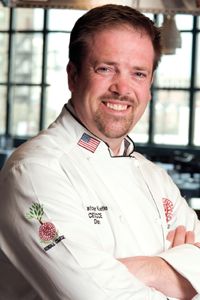 A simple concept conceived by the School of Culinary Arts at Kendall College turned out to be a powerful tool with which to teach culinary-arts students how to achieve impeccable flavor in every dish.
A simple concept conceived by the School of Culinary Arts at Kendall College turned out to be a powerful tool with which to teach culinary-arts students how to achieve impeccable flavor in every dish. Hand pies are the latest incarnation in the mini-dessert trend, crêpes add adventure to diners’ repertoires, and nuts, dessert butters and spoonables are big.
Hand pies are the latest incarnation in the mini-dessert trend, crêpes add adventure to diners’ repertoires, and nuts, dessert butters and spoonables are big.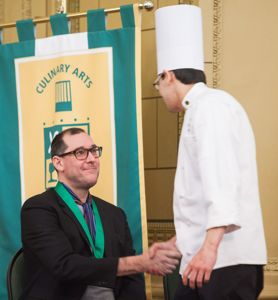 Mark Ladner, executive chef of Del Posto in New York, tells CIA grads to always be students and remain curious.
Mark Ladner, executive chef of Del Posto in New York, tells CIA grads to always be students and remain curious. In the culinary world, learning the “how” and its many variations is a critical part of students’ education. One way to teach curiosity is to capitalize on the five “W”s.
In the culinary world, learning the “how” and its many variations is a critical part of students’ education. One way to teach curiosity is to capitalize on the five “W”s. For starters, temperature and heat are not the same thing. When is convection mechanical, and when is it natural? And is food cooked by radiation harmful? Chef Weiner explains why all culinary students should understand the basic science behind critical processes in the kitchen.
For starters, temperature and heat are not the same thing. When is convection mechanical, and when is it natural? And is food cooked by radiation harmful? Chef Weiner explains why all culinary students should understand the basic science behind critical processes in the kitchen.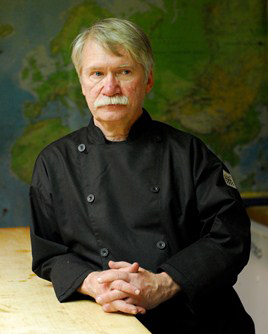 Change is challenging, but necessary for growth. When striving to be the instrument of positive change, a successful, simple way to intercept every reason given for resistance is to utter the single word, “Why?”
Change is challenging, but necessary for growth. When striving to be the instrument of positive change, a successful, simple way to intercept every reason given for resistance is to utter the single word, “Why?”